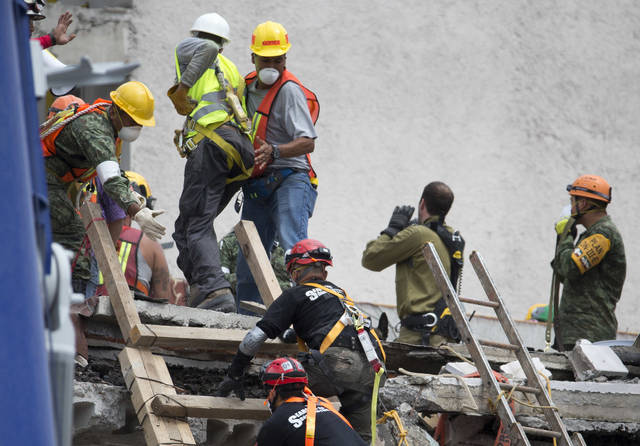Searchers dig as Mexico City reopens just 1% of schools

ASSOCIATED PRESS
Rescue workers quickly evacuated the site of an office building in the Roma Norte neighborhood of Mexico City today.
MEXICO CITY >> Search teams are still digging in dangerous piles of rubble hoping against the odds to find survivors at collapsed buildings, while officials say they have so far cleared only 103 of Mexico City’s nearly 9,000 schools to reopen Monday.
The need to inspect 98 percent of the capital’s public and private schools nearly a week after a magnitude 7.1 earthquake killed at least 182 people in the city and 138 in nearby states was a stark indicator of just how long the path back to normalcy will be.
Federal Education Secretary Aurelio Nuno said today that it could take a couple more weeks to inspect all of the schools. As school inspections progress, the government will announce each day which schools have been cleared to resume classes. For schools found to have structural damage, students could be put in temporary classrooms.
“For the safety of the boys, the girls, the teachers and for the peace of mind, of course, of all the fathers and all the mothers, all schools will be inspected,” Nuno said.
Rescue operations remained active in at least three sites in Mexico City — two apartment buildings and an office building — but hope dimmed every time rescuers had to retreat due to instability of debris. But no one has been found alive since Wednesday, when a woman was pulled from debris.
As darkness fell today, prayers were held by families who have been gathered near the collapsed office hoping missing relatives will be found. A crowd of onlookers watching swelled, and so did the number of volunteer workers. Teachers at one corner tried to entertain children of some of the waiting families. There also appeared to be more people offering psychological support.
Don't miss out on what's happening!
Stay in touch with breaking news, as it happens, conveniently in your email inbox. It's FREE!
Hugo Luna, whose cousin Erika Gabriela Albarran was believed trapped in the fallen building, complained that officials had not immediately informed families when two bodies were removed Saturday night. “There is a lot of distrust of authorities,” he said.
His aunt, who was also inside the building when the quake hit but escaped, is traumatized, he said.
“Nothing happened to her, but now she has panic attacks,” Luna said. “You open the door, she hears a noise and she gets scared.”
For the family of Adrian Moreno, a missing 26-year-old human resources worker at an accounting firm, the emotional roller coaster is getting to be too much. Moreno’s mother had a look of anguish and largely stopped being able to speak. His boyfriend, Dario Hernandez, also looked lost, his gaze tear-stained and unfocused.
“Just hearing the earthquake alarm was horrible,” Hernandez said of a siren that rang during a 6.1 quake Saturday morning that was an aftershock of an even bigger temblor that struck in southern Mexico on Sept. 7.
Looking at the huge pile of rubble, Hernandez started to comment. “Something moves and …,” he said, his voice trailing away at the unspeakable thought that the whole pile could suddenly collapse.
“There is a lot of nervousness, a lot of desperation,” he finally said. “… This is the worst thing I have ever seen in my life, the worst.”
A total of 38 buildings in the Mexican capital — mostly apartment blocks or office buildings — collapsed in Tuesday’s earthquake.
The first days saw a dramatic scramble with picks, shovels and bare hands to reach survivors. Mexican marines, the lead force in many of the rescue efforts, said they had recovered 102 bodies and rescued 115 people alive from toppled structures.
Thousands of people are homeless because their houses or apartment buildings, while still standing, are too dangerous.
Mexico City Mayor Miguel Angel Mancera said 7,649 damaged properties had been examined so far and 87 percent were deemed safe, needing only minor repairs. But that means nearly 1,000 were found uninhabitable — and the number seemed likely to rise as more are inspected.
One by one the searches have closed down in recent days, after sniffer dogs were sent in and didn’t find life and thermal imaging devices turned up no body heat signatures. Heavy machinery moved in to begin removing the mountains of debris. Empty lots began to appear where just days ago a building stood.
At one of the collapsed apartment buildings still being searched, members of a Japanese search and rescue team pulled a small white dog from the rubble alive today, cradling and petting it as they brought it down.
The dog’s rescue gave hope to residents and neighbors of the building who successfully got an injunction from a judge Saturday night requiring the rescue operation continue for at least five more days.
Isaac Garcia, spokesman for the neighbors, said the injunction was a precautionary measure to make sure the search continues at the site wrecked by Tuesday’s earthquake.
He said residents and neighbors had maintained a good relationship with the navy and civil defense authorities running the search operation at the site. But, Garcia said, “We wanted to make sure that we had something based in law to protect us.”
Back at the collapsed office building, volunteer rescue worker Johny Yebra said the smell of death was now heavy directly atop the rubble heap, and by Sunday afternoon occasional gusts of wind were blowing it outside the immediate search site.
“All of us are doing the most we can,” Yebra said.



